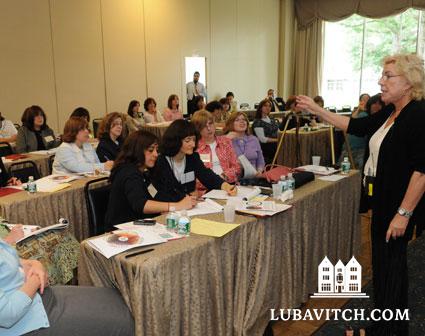(lubavitch.com) One hundred twenty teachers from Chabad Lubavitch yeshivas and day schools across North America tackled strategies that will allow them to better address the learning needs of the class that awaits them, pencils sharpened, this September.
Dr. Bernice McCarthy of Chicago’s About Learning Foundation, presented at the annual Chabad educators’ conference last week. The 4Mat method, a lesson planning strategy offers a user-friendly structure for incorporating best pedagogical practices — from the classic insights of Piaget to modern day differentiated instruction together with the latest research on how the brain learns – into one lesson.
“Becoming familiar with 4Mat is like attending ten college courses,” said Estee Cohen, M.A. Ed., a curriculum design specialist who teaches at a Chabad school. The presentation inspired a core group of teachers from Chabad schools to attend more intensive 4Mat course this year.
New techniques and teaching applications to reach students of diverse abilities were the highlights of the conference. Developed by the Chinuch Office, Chabad’s center for education, the two-day conference featured presentations that revolved around reaching all students, from lesson planning to self-evaluation. A diverse group of master educators, such as Dr. Rochelle Green, dean of the Fischer Graduate School of Education of Nova Southeastern University; Dr. Nechie Rochel King, a professor emeritus of Towson University, and Dr. Bernice McCarthy offered insights tailored to the challenges inherent in teaching Judaic studies in Chabad oriented schools.
“Our educational professionals are increasingly sophisticated, and they demand a panel of presenters and workshops that equals their expectations,” said Rabbi Nochem Kaplan, director of the Chinuch Office.
Chabad’s network of schools in the U.S. and Canada includes more than 175 early childhood centers, 95 elementary schools, 54 high schools and 19 schools of higher education, with a combined enrollment of nearly 30,000 students.
Chabad schools welcome Jewish children of all affiliations, instead of one homogenous group. As a consequence, educators at these schools face a unique set of issues that led to a call for a Chabad-centric teachers’ conference. Now in it sixth year, the conference drew one of its largest groups ever, and an equal or greater number of conferees are expected at the two-day event for male teachers scheduled for August 11-12.
Workshops and lectures at this year’s conference left Malkie Gurkow, an elementary school teacher at Yeshiva Academy of Worcester, MA, motivated.
“It was phenomenal how all the sessions complemented each other. We were presented with comprehensive and practical ideas that I know I will implement this year,” Mrs. Gurkow said.
Receiving special emphasis at this year’s conference was the state of mind and motivation of the teacher. Dr. King’s workshops, among others, provided educators with a step-by-step format for a teacher’s growth from the inside, out.
Teachers at Chabad schools already “have the talent, expertise, insight and strength to make the difference they need to make,” said Dr. King. Methodical self-reflection as a conscious process provides teachers with the impetus to “bloom and blossom, and teach year after year in a new and exciting way.”
Avoiding burnout is a matter of great urgency when a classroom is populated with children who have learning disabilities. Anna Rich, program director of the Learning Disabilities Association of St. Louis, MO, gave a hands-on course in empathy when she guided conferees into the minds of learning disabled children. To mimic the difficulties faced by children with learning disabilities, Rich had the teachers write using arbitrary rules. As the teachers attempted to comply, the cross outs and eraser marks proliferated, and more than a few crumpled papers lay scattered across the workshop tables.
“When teachers get a taste of the frustration faced by learning disabled students, they are more likely to understand why a child is acting out, why a trip to the principal’s office is not helping, and why it’s vital to pursue different strategies on their behalf,” said Rich.
In a breakout session, Rabbi Chayim Boruch Alevsky, youth director of Chabad of the West Side in New York City invited teachers to join a ground breaking Torah studies methodology. “Tools for Torah” is an evolving resource, created through the input of educators from around the world, for teaching Torah in a way that builds students’ Biblical Hebrew skills and helps them discover the relevance of the ancient words.
“Teachers struggle to finish a Parsha [Torah portion] while their real goal is for their students to be infused with life and meaning from the words,” said Rabbi Alevsky. Tools for Torah aims to entwine the two in a way that sparks a lifelong interest in the subject.
Engendering enthusiasm for studies that are foreign to students, in language and custom, and do not have a linear connection to earning a living, is the high water mark that teachers of Judaic studies are expected to reach every year. Attending the Chinuch Conference helps even long time educators like Shulamis Rothman of Yeshiva Schools of Pittsburgh rise to the challenge.
“After 35 years of teaching, it is seldom that something new is revealed, but this year’s team brought many loose ends together. I walked away from the sessions feeling, ‘I can do this.’”

Be the first to write a comment.